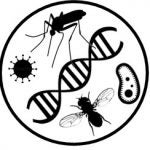Research
RESEARCH INTERESTS: Our current research endevours have two main foci: Eco-immunology and Evolutionary Genetics.
Eco-immunology investigates the ecological causes of host immune system variation, which is driven by the interaction of the host, pathogen, and environment. Ultimately, such host variation influences disease prevalence and intensity, which contributes to disease dynamics in natural systems. Our interests in this new field revolve around three areas, including (1) how spatiotemporal environmental variation shapes host immunity, (2) how environmentally-induced variation in vector immunity contributes to disease dynamics, and (3) how hosts strategically alter immune system investment according to host population parameters (density, sex ratio, breeding season), pathogen type (virulent vs. avirulent) and host status (age, sex, nutrition and reproductive opportunity). Some current eco-immunology projects include:
- How anthropogenic disturbance modulates mosquito-vector immunity and disease transmission
- How predicted climate change will influence insect immune system evolution
- The role of contemporary seasonal dynamics on insect vector immunity.
- Trans-generational effects of parental environment on offspring immunity
With regard to evolutionary genetics, my lab is interested in how genetic conflicts are both created and/or resolved by uniparentally inherited genetic elements; specifically mitochondria and Y-chromosomes. Some current evolutionary genetics projects include:
- How mitochondria affect disease in humans
- The potential for Y-chromosomes to dramatically reduce evolutionary rates
- The role of Y-chromosomes in male reproductive and immune systems trade-offs.
RESEARCH APPROACH: Our research program has become an amalgamation of methods, drawing theory and technique from several different disciplines within evolutionary biology. For instance, to understand general evolutionary constraints within metapopulations or within whole organisms, we draw on population and quantitative genetic techniques, respectively. To understand complex interactions between the environment and organism physiology, we employ a life histories approach. To understand the constraints on immune system evolution, we use sub-organismal genetic analysis and transcriptomics.
Although our research objectives are generalizable to all animals, we have come to rely heavily on several insect systems, including the ground cricket Allonemobius socius, the fruit fly Drosophila melanogaster, the Asian Citrus psyllid Diaphorina citri, and the yellow fever mosquito, Aedes aegypti. These systems offer ease of laboratory manipulation while also providing the opportunity for field-based projects.
